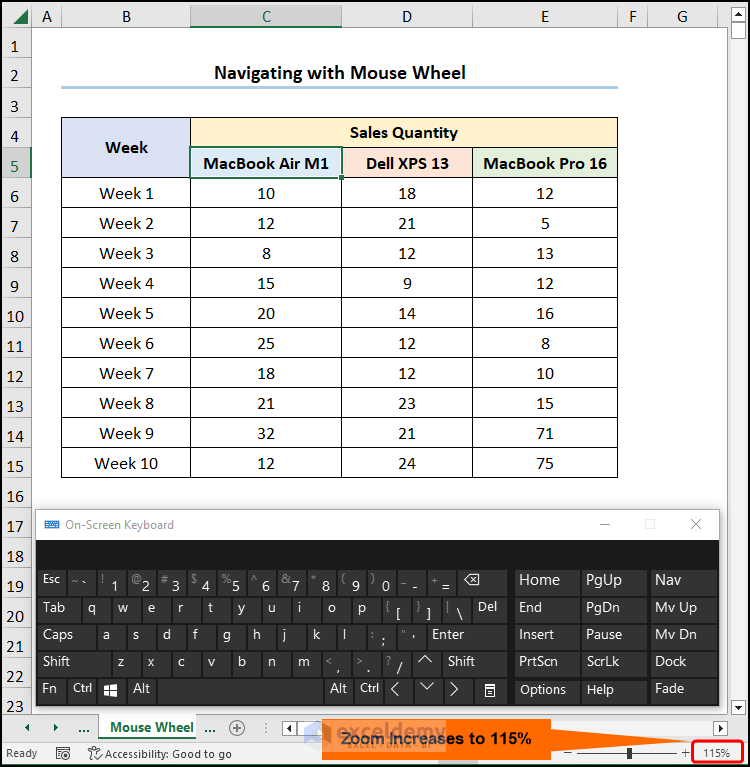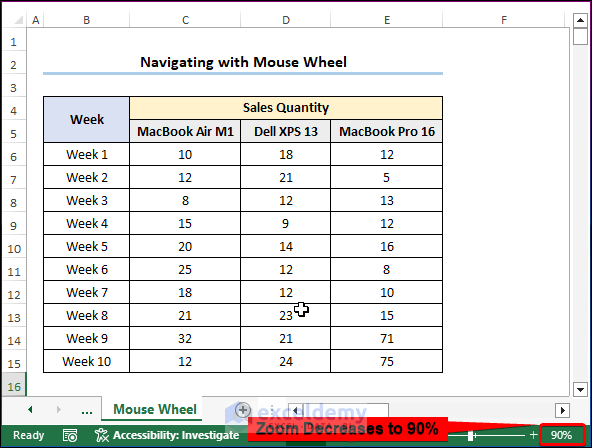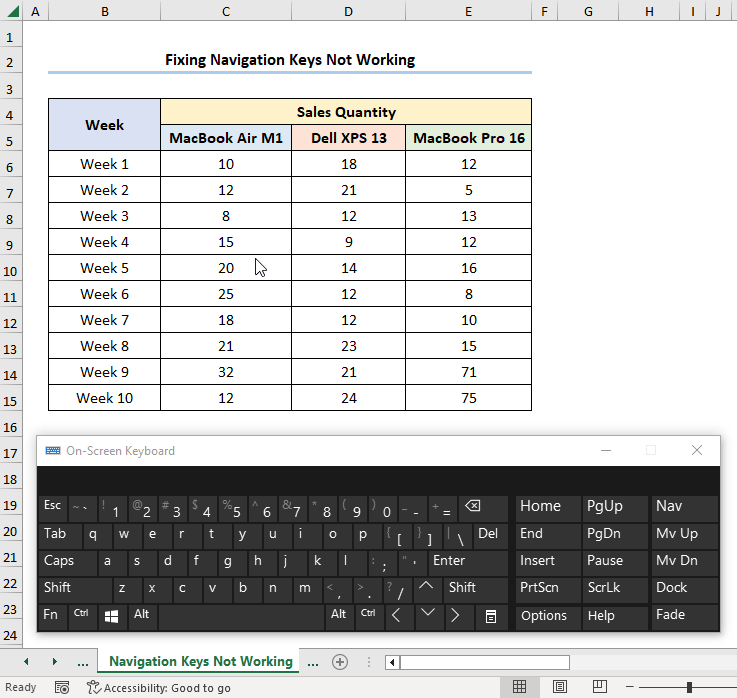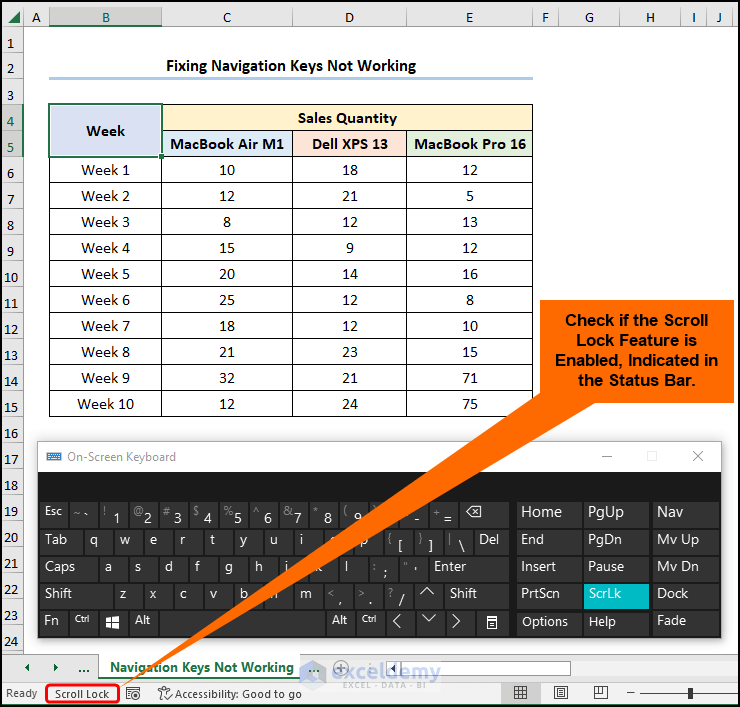In Excel, using navigation and shortcut keys can speed up your movement and help you navigate more accurately, especially in larger spreadsheets. It also improves our productivity and time management when working in Excel. We’ll have to improve the actions we perform most often in Excel, that is, navigating around the worksheets and selecting cells.
In this Excel tutorial, we will demonstrate to you how to use navigation keys in Excel. In addition, you will learn to fix the issue of navigation keys not working.
In the following GIF, I have shown one simple example of using navigation keys to navigate between worksheets.
6 Examples of Using Navigation Keys in Excel
Excel’s navigation keys are essential for smooth spreadsheet navigation. The arrow keys easily move you between cells, while Page Up and Page Down help you scroll through data. Home and End keys efficiently take you to the start or end of a row.
Navigation keys, along with other combinations, streamline tasks, ensuring a more effective and efficient Excel experience for various applications. We will use these navigation shortcut keys to navigate across Excel cells, worksheets, rows, columns, and many more.
To use navigation keys, follow the given examples with detailed instructions:
Navigating Within Excel Cells
In Excel, moving around cells is important for doing things quickly. Whether you’re putting in information, looking at data, or organizing your sheet, being good at cell navigation makes using Excel easier.
To learn the basics of moving around cells in Excel, you’ll find a handy list of shortcuts for navigating in the table below:
| Keys | Action |
|---|---|
| Left, Right, Up, and Down Arrow | Moves by one cell in the direction of the arrow |
| Ctrl+Arrow Key | Moves to the boundary of the dataset |
| SHIFT+Arrow Key | Selects one cell in the direction of the arrow |
| Ctrl+Shift+Arrow Key | Selects all the non-blank cells in the direction of the arrow |
| Tab | Shifts to the right by one cell |
| Shift+Tab | Shifts to the left by one cell |
| Home | Jumps to the start of the row |
| Ctrl+Home | Moves to the first cell (A1) of the worksheet |
| End | Goes to the next blank cell in the row |
| Ctrl+End | Proceeds to the last unused cell at the bottom |
| Page Up | Moves up by one page/screen |
| Page Down | Goes down by one page/screen |
| ALT+Page Up | Scrolls to the left by one unit of screen |
| ALT+Page Down | Scrolls to the right by one unit of screen |
The following image shows the directional Arrow Keys (Up, Down, Left, and Right) that are needed to navigate the cells in the worksheet.
Imagine a situation where you have hundreds of rows in your dataset, and you need to jump from the first to the last row.
To navigate from the top to the bottom row, follow the instructions below:
- First, select the cell, which is the first row of the table.
- Press Ctrl+Down Arrow keys (🔽).
This will take you to the last row in the column of the selected cell.
Moving Across the Selected Ranges
In Excel, after selecting a range of cells, use the arrow keys for precise navigation within that selection. This allows for quick and accurate editing, formatting, or applying formulas.
Additionally, you can navigate across a selection of cells using the keys listed in the table below:
| Keys | Action |
|---|---|
| Tab | Shifts to the right/down by one cell in the selected cells |
| SHIFT+Tab | Moves to the left/up in the selected range |
| ENTER | Proceeds from top to bottom by one cell in the selected cells |
| SHIFT+ENTER | Jumps from bottom to top |
To select a range of cells and then move across them using the shortcuts, follow the steps below:
- Navigate to the B5 cell > Ctrl+SHIFT+ Down Arrow keys (🔽).
- Next, click the Tab key from the on-screen keyboard, as shown below.
This will move the cursor down by one cell from the top.
You can observe the steps in real time in the GIF below:
Navigating Throughout Worksheets
To switch worksheets while working with Excel, there are shortcuts to switch to the next and previous worksheets:
| Keys | Action |
|---|---|
| Ctrl+Page Down | Navigates to the following worksheet |
| Ctrl+Page Up | Moves to the preceding worksheet |
The following GIF shows how the Ctrl+Page Down and Ctrl+Page Up keys help to switch between the two worksheets:
Using Scroll Lock Feature
The Scroll Lock option allows us to scroll large spreadsheets without having to lose track of the active cell.
The following table contains a list of keys that you can utilize with the Scroll Lock option:
| Keys | Action |
|---|---|
| Scroll Lock then, Up/Down Arrow | Shifts up/down by one row |
| Scroll Lock then, Left/Right Arrow | Moves left/right by a unit row |
| Scroll Lock then, Ctrl+Left/Right Arrow | Navigates left/right by one window |
| Scroll Lock then, Ctrl+Arrow Keys | Scrolls across large distances |
If you want to scroll a large worksheet using the Scroll Lock feature, follow the detailed instructions below:
- Click on the Scroll Lock button to enable this feature.
- Then, press the Ctrl+Right Arrow (➡) key, as shown in the image below.
As a result, the screen moves to the right side by one page.
You can see the steps in the following GIF for a live demonstration:
Note: As a note, when Scroll Lock is enabled, the text “Scroll Lock” appears in the Status Bar.
Using Scroll Bars
Ye can also use the Scroll Bars to navigate through rows and columns in an Excel worksheet. The following table lists the actions performed by the Scroll Bars keys:
| Keys | Action |
|---|---|
| Moves across one column left or right | |
| Shifts through one row up or down | |
| Dragging the horizontal and vertical scroll bars scrolls through large distances | |
| Mouse Wheel | Moving the mouse wheel forward or backward scrolls up or down |
The following GIF shows the actions performed by the Scroll Bars keys:
Using the Mouse Wheel to Scroll and Zoom
You can also control various other aspects of zooming and scrolling in Excel with the help of the Mouse Wheel.
The following table contains a list of actions performed using a combination of navigation keys and the mouse wheel:
| Keys | Action |
|---|---|
| Ctrl + SHIFT + Mouse Wheel | Moves the window to the left or right |
| Click Mouse Wheel | Pan across the spreadsheet |
| Ctrl + Mouse Wheel | Zooms in or out of the worksheet |
If you want to scroll and zoom in and out of the worksheet using the Mouse Wheel, follow the below steps accordingly:
- Hold down the Ctrl button and move the Mouse Wheel forward.
This will increase the zoom to “115%” as shown in the Zoom Indicator.
- Similarly, hold down the Ctrl button and move the Mouse Wheel backward to zoom out.
What to Do If Navigation Keys Are Not Working in Excel?
Have you faced a scenario where the navigation keys don’t work? Effective management of data is essential, and productivity can be compromised when the arrow keys show irregular behavior. This irregularity of arrow keys usually occurs if the Scroll Lock option is enabled.
The GIF below shows the problem when the Scroll Lock is on, while switching it off resumes the normal behavior of the navigation keys.
To fix this problem, you can follow the steps below:
- Check whether the Scroll Lock option is active by looking at Excel’s Status Bar.
- If the Scroll Lock option is turned on, simply press/click the Scroll Lock key from the computer/On-Screen keyboard to turn it off.
The navigation keys will now work properly.
Download Practice Workbook
Conclusion
This Excel tutorial provides examples and instructions on how to navigate within cells, move across selected ranges, navigate throughout worksheets, use the scroll lock feature, use scroll bars, and use the mouse wheel to scroll and zoom. It also addresses what to do if navigation keys are not working in Excel. If you have any queries, please leave a comment below.
Frequently Asked Questions
How can I navigate through Excel comments and annotations?
Use shortcuts like Shift+F2 to quickly access and edit cell comments, enhancing your ability to manage and communicate additional information within your spreadsheet.
How do I navigate through Excel’s Find and Replace feature?
Use shortcuts like Ctrl+F to open the Find dialog and Ctrl+H for Replace, streamlining the process of locating and modifying data within your spreadsheet.
Can I create Custom-Named ranges for easy navigation in Excel?
Yes, you can define named ranges to make navigation easier. Go to the Formulas tab and click on Name Manager to create a new named range. Then, you can navigate to that named range by using Ctrl+G and selecting the range from the list.
Related Articles
- How to Use Navigation Pane in Excel
- How to Create Navigation Buttons in Excel
- [Fixed] Excel Navigation Arrow Keys Not Working
- How to Perform Tab Navigation in Excel
- How to Navigate Large Excel Spreadsheets
- Perform Cell Navigation in Excel
- How to Navigate Between Sheets in Excel
<< Go Back to Navigation in Excel | Learn Excel
Get FREE Advanced Excel Exercises with Solutions!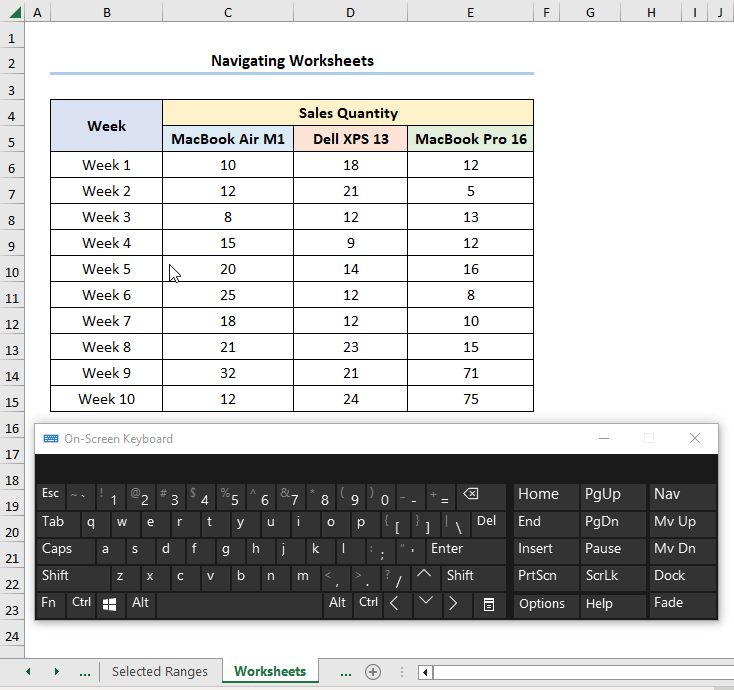
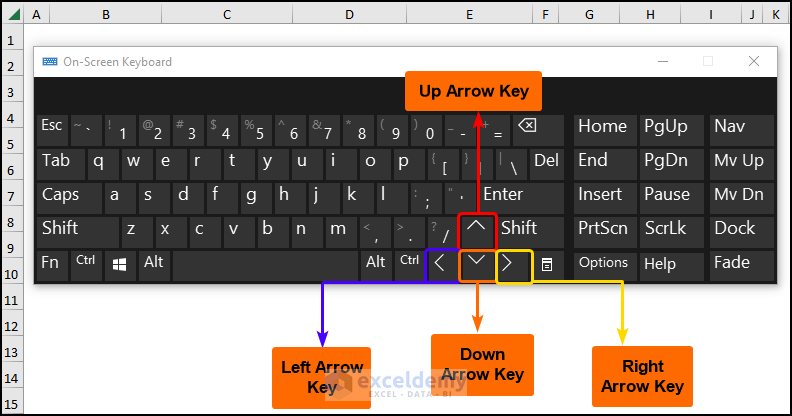
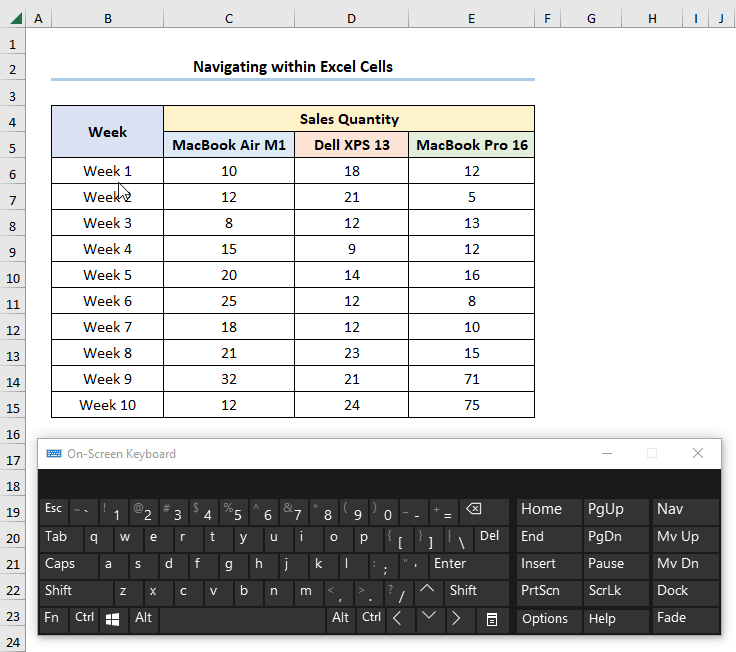
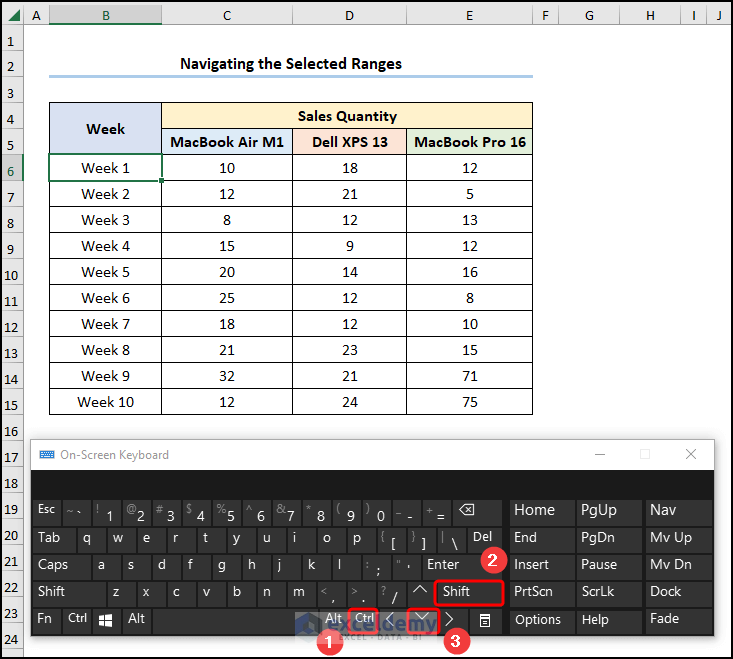
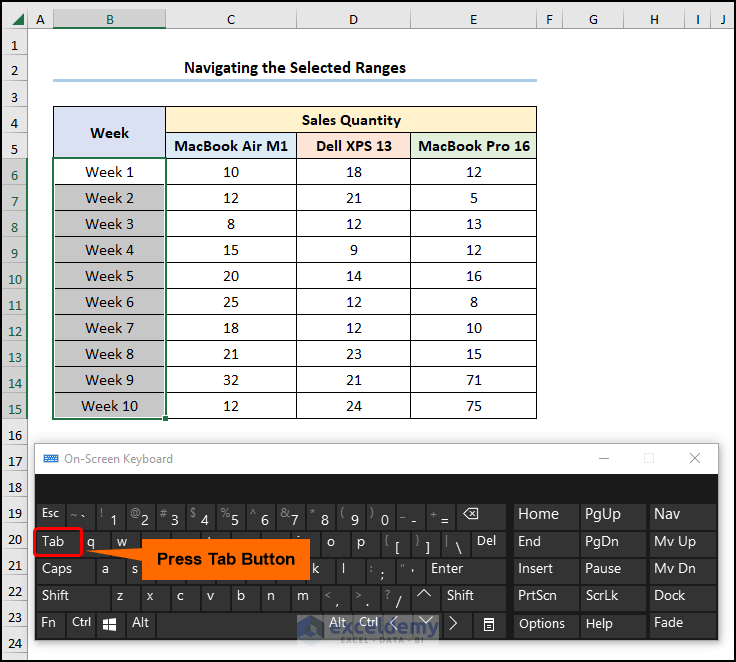 This will move the cursor down by one cell from the top.
This will move the cursor down by one cell from the top.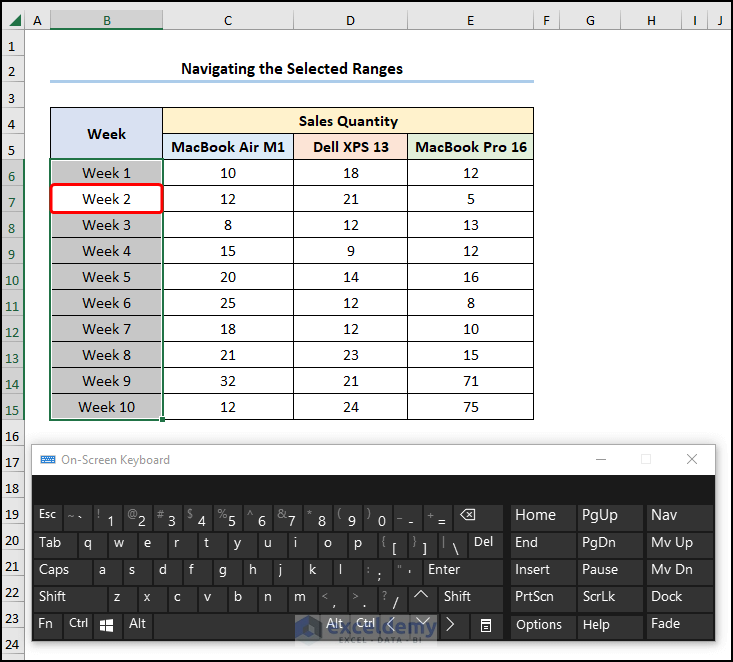
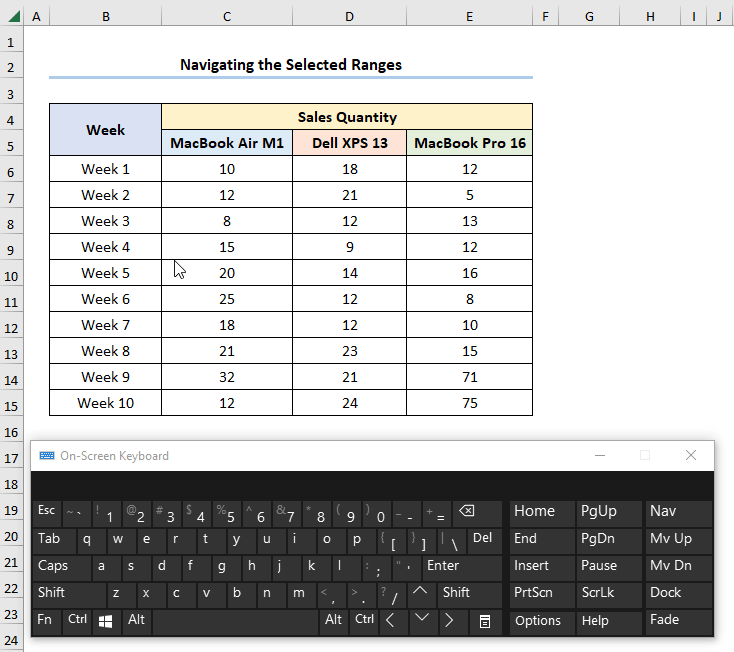
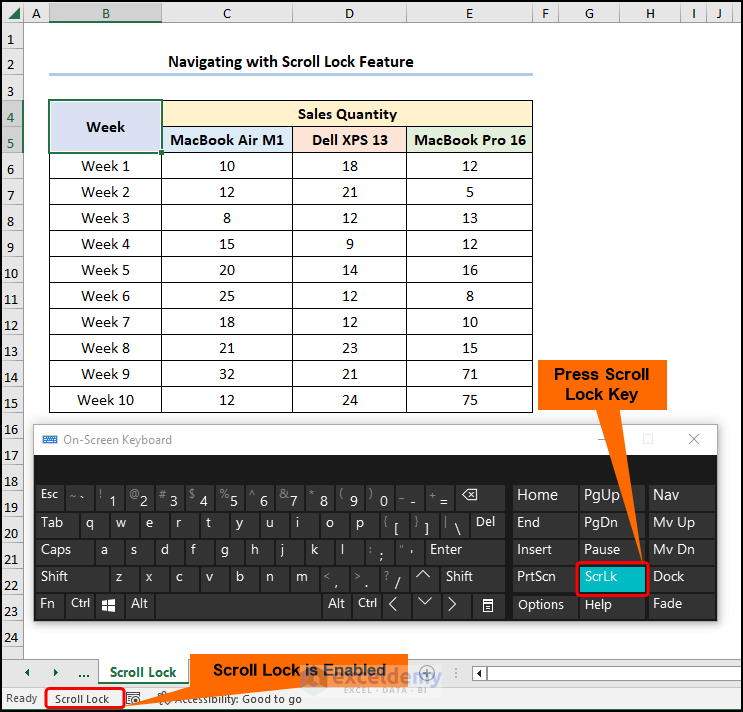
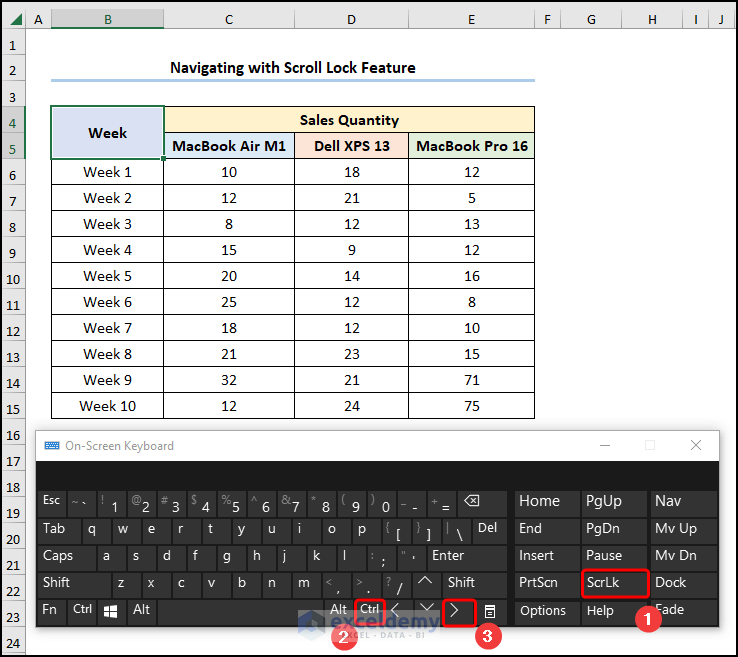 As a result, the screen moves to the right side by one page.
As a result, the screen moves to the right side by one page.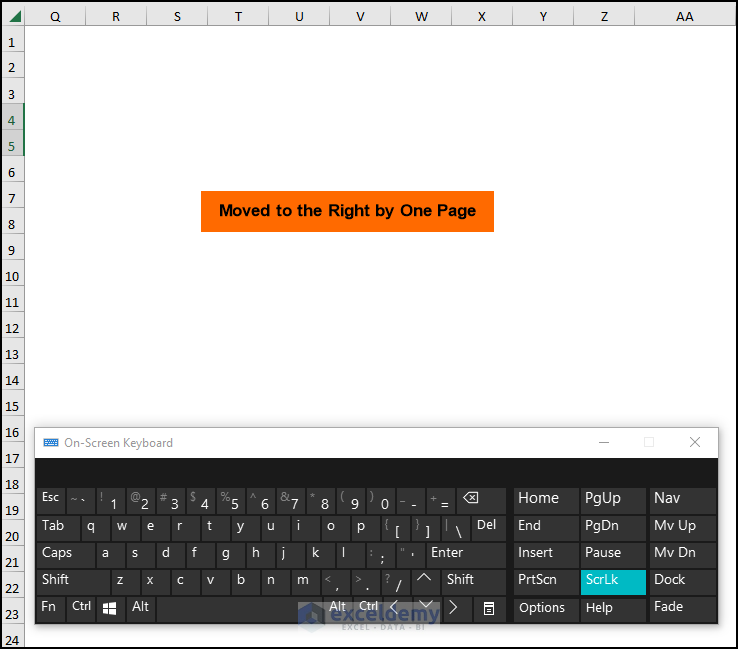
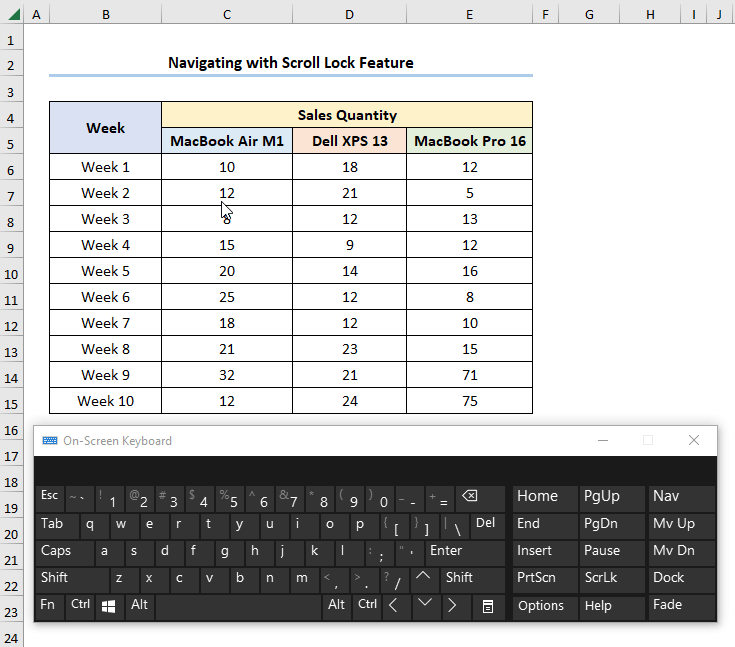
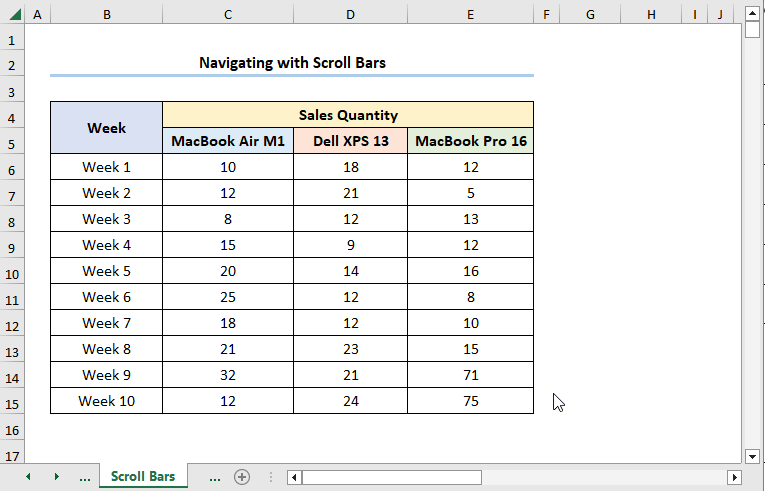
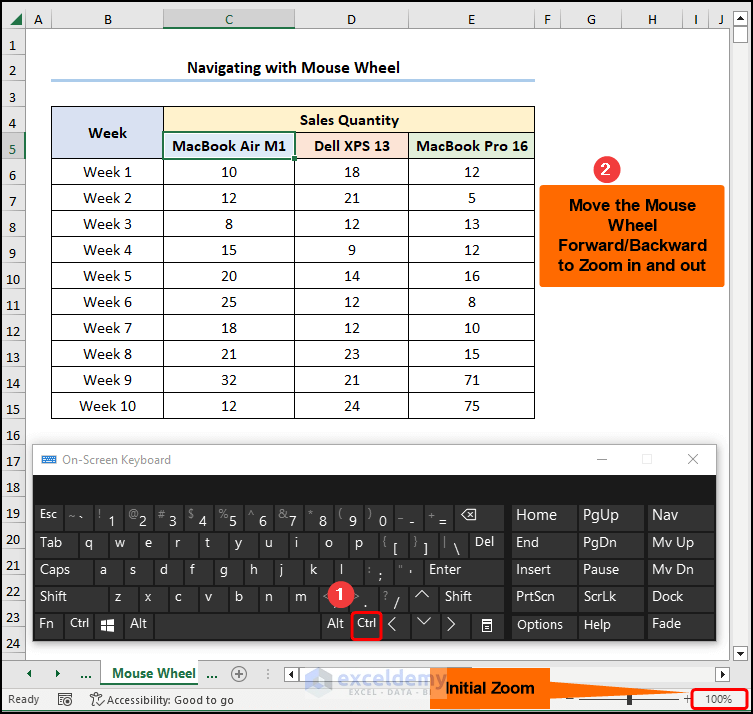 This will increase the zoom to “115%” as shown in the Zoom Indicator.
This will increase the zoom to “115%” as shown in the Zoom Indicator.